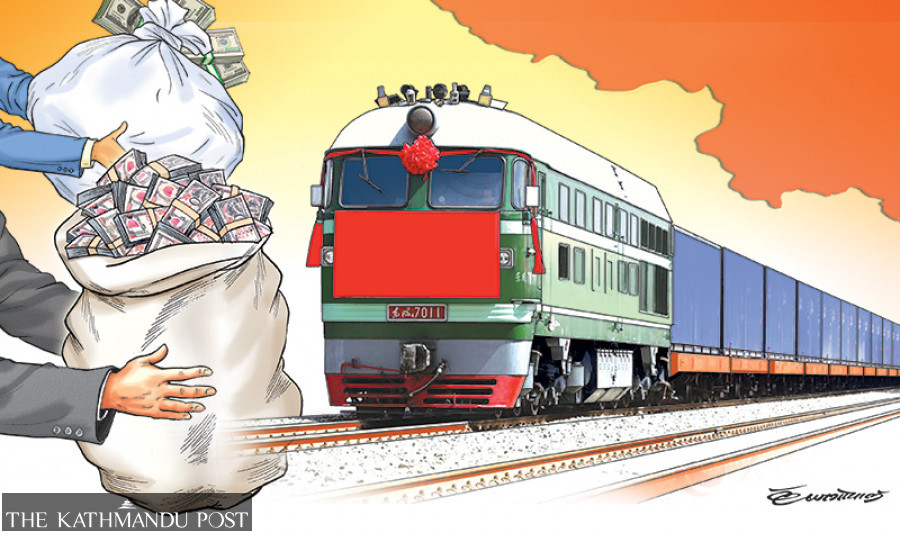Politics
Chinese rail among UML’s top foreign policy priorities
Manifesto aims to reassert control over Kalapani, Lipulek.
Purushottam Poudel
As CPN-UML leaders work to finalise the party’s manifesto for the November elections, they have decided to include the construction of Nepal-China railroad as a major electoral pledge.
They also plan on attaching high priority to the implementation of the agreements reached with the northern neighbour on trade and transit, roads, and petroleum trade. Nepal and China signed the yet-to-be-implemented agreement on petroleum supply in October, 2015.
Back in 2017, the UML, which had partnered with the CPN (Maoist Centre) in the elections that year, had also pledged to connect Nepal with China by a railroad. Yet there has been no progress on the project.
“Developing Nepal's external relations based on the principles of reciprocity, balance, independence, and non-alignment will form the core of the manifesto,” the party’s deputy general secretary Pradeep Gyawali, who is also a member of the manifesto drafting committee, told the Post.
“Our manifesto calls for transforming our relations with neighbouring countries into economic partnership and resolving outstanding issues, particularly those with India. Restoring Nepal’s control in Limpiyadhura, Kalapani and Lipulek, and resolving border issues with India will be the manifesto’s other major features.”
But many of the issues that the UML plans to include in the manifesto, including those on neighbourhood relations, were put on the backburner when the party led the government for three consecutive years. The Belt and Road Initiative (BRI) agreement with China is one of them.
Gyawali, who was minister for foreign affairs for three years in the Oli-led government, disagrees.
“The agreement on the BRI was just a framework agreement. The Trans-Himalayan Multidimensional Connectivity Network is what the BRI means in Nepal’s context. As we successfully chose nine projects under the BRI, it would be unfair to claim that our government did not prioritise the BRI.”
The director of the China Study Centre, Sundarnath Bhattarai, doesn’t buy Gyawali’s claims that the Oli administration prioritised BRI implementation.
“Nepali parties make all kinds of promises in their election manifestos but none have been serious about fulfilling them,” said Bhattarai.
According to UML leaders, the party manifesto will promise to pursue BRI projects. On the other hand, the current Congress-led government is against taking forward the costly projects until China agrees to build them on grants. The Congress has dismissed the idea of funding the projects through loans. Yet even UML leaders are unclear on whether they plan to implement the projects through loans or grants.
Those closely observing the proposed Nepal-China railway project have said the project is fraught with geological challenges and will cost billions of dollars. So Nepal has no option but to rely on Chinese funding.
On September 9, Zhang Jiadong, a professor at Fudan University in China, said the proposed Nepal-China cross-border Lhasa-Shigatse-Kerung-Kathmandu railway could cost around $8 billion—with the Nepali leg alone gobbling up over $3.5 billion—suggesting China might not fund the project through grants.
“Since the Mao era, Chinese leaders had a plan to expand railways to Nepal, with an eye on the Indian and South Asian markets,” Rupak Sapkota, a China expert, told the Post. “But the plan got delayed due to the subsequent changes in the geopolitics of South Asia.”
According to him, China’s strict ‘zero-Covid’ policy may change after the 20th Congress of the Chinese Communist Party that started Sunday. When China relaxes its Covid restrictions, work on the railroad’s feasibility study will move ahead, he said.
During Foreign Minister Narayan Khadka’s China visit in August, foreign ministers of the two countries had reached an agreement for a feasibility study of the Kerung-Kathmandu rail link to be undertaken on Chinese grants.
UML leaders said they will incorporate in the manifesto the agenda of boosting economic ties with both China and India.
“The manifesto prioritises strong connectivity with both our neighbours—with India through Raxaul-Kathmandu train and with China through Kerung-Kathmandu line,” said Gyawali. “The goal is not to have to rely too much on any one neighbour.”
Traditionally, Nepal has been heavily dependent on India, mainly for trade. While Nepal imports most of its goods from India and some from China, Nepal’s exports to the two neighbours are negligible.
By striking trade and transit deals with China and South Asian countries other than India, the UML intends to reduce Nepal’s dependence on India. The UML has also reaffirmed its goal of building a uranium mining and processing facility in Mustang, said a leader involved in drafting the manifesto. The party manifesto promises to explore petroleum in Nawalparasi and mine iron in Dailekh.
Apart from that, nationalism, development, creation of national capital, and good governance feature prominently in the manifesto.
The party is planning to set out 25 ambitious goals in the manifesto that the leaders claimed would be accomplished in five years if they win elections and form government.
The UML promises to complete the projects initiated by the Oli government but left unfinished after the government was toppled. Also, the manifesto will defend the UML chief’s decisions to twice dissolve the Parliament.
Other pledges in the manifesto include the country’s economic transformation, construction of both reservoir-type and run-of-river hydropower projects, as well as solar power and alternative energy projects over the next decade.
The UML had formed an eight-member manifesto drafting committee under the leadership of party chair Oli on August 11. Ishwar Pokharel, senior vice chair; Astalakshmi Shakya, vice chair; Ram Bahadur Thapa and Bishnu Prasad Paudel vice chair; Shankar Pokharel, general secretary; and deputy general secretaries Pradeep Gyawali and Bishnu Rimal are members of the committee.
The party plans to hit the campaign trail with the manifesto soon.




 17.12°C Kathmandu
17.12°C Kathmandu















